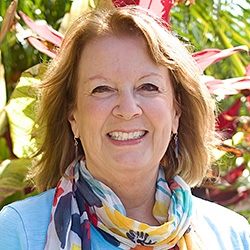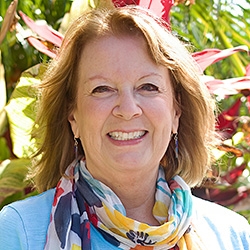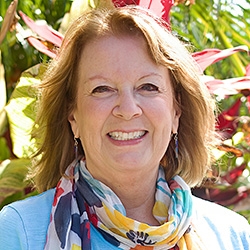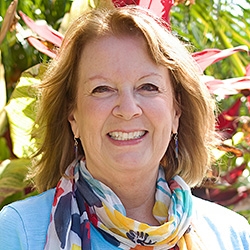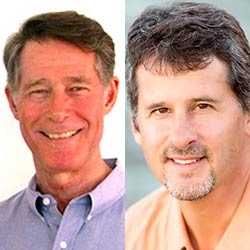

Search Results: giving
-
2020 has added three major global crises to our long and painful list of ongoing challenges:
- Public health crisis emerging from the Coronavirus infecting humans;
- Governance crisis manifesting especially in global protests against police brutality and governments more generally; and
- Economic crisis unfolding from responses to the pandemic.
And as a result, many of us who share NVC with others have been feeling a growing unease about our roles. I have heard from quite a few who want to go beyond using NVC primarily as a personal growth tool within the market economy, and often don't know how to do so. This course is designed to respond to this need by supporting anyone who shares NVC with others – regardless of experience or certification – in opening to the way systemic perspectives deepen and transform how we bring NVC to people, communities, and organizations.
-
Trainer Tip: When we express appreciation using words like "good", "great" or anything else evaluative, it conveys we are in the position to judge, and that we've judged them or their actions. Instead, to express appreciation without judgment state what they did, how you feel about what they did, and which of your needs are met by their behavior. Such an expression of appreciation clearly states how your life was enriched, without judgement.
-
Ask the Trainer: Feeling frustrated & angry over simple things? Find the root of your hidden needs.
-
Eric Bowers explains how needs and strategies correlate to different brain hemispheres, and how relaxing into our needs opens us to greater possibilities.
-
One of the premises in NVC is that behind all behavior and expressions are Universal Human Needs as the deeper motivators. And one of the key distinctions in NVC is that between Needs and Strategies. Try Alan Rafael Seid's exercise called "Peeling the Layers of the Onion, " a process for uncovering these needs — the deeper motivations — that underlie words and behaviors we may find disturbing or puzzling.
-
Kelly shares how freedom and autonomy create strong, healthy, and loving relationships.
-
This telecourse recording is for anyone wanting to integrate empathy into his/her life in a more natural, authentic way.
-
We all love to contribute to others’ lives. We love to offer support because it meets our own needs for contribution, love, caring, and making a difference. For today, admit that you love to support other people, and that you would like support yourself. Let at least one person contribute to your life today. Read on for a related story.
-
Much like other asymmetric relationships (such as therapist and client), there are complications related to power dynamics that can arise with any NVC trainer having sex with a participant. For one, there's (counter)transference. And there's potential for things that may not move outside this asymmetric relationship -- such as projections where the participant, and/or the trainer, is guided by un-healed pain of their "inner child".
-
There's the real need. And then there's the privilege that’s offered as a substitute for it. Privilege substitutes support the existing structure of society. It can look to us as if giving up the privilege would amount to giving up everything -- if we don't believe the real needs can even be experienced. If we connected directly to the needs, we could become subversive, agents of change.
-
Trainer Tip: Persisting without demanding is the art of what Marshall Rosenberg fondly called "Dogging for our needs." We can learn to not give up on our needs and at the same time, refrain from demanding they be met.
-
The human species is trained and habituated towards separation. This model encourages humans to either give up on their needs or fight for their needs. In this short video, Miki shares how increasing capacity shifts habits of separation and supports holding of all needs. Through intensive lifelong practices we learn to increase our capacity to receive and to increase our capacity to be generous supports our overall capacity to hold all needs.
-
What happens when both people are trying to give one another at the exact same time without responding to the empathy guess? (Disclaimer: This is a humor piece. To understand why this cartoon might be funny it’s useful to have some experience with NVC and the NVC community.)
-
Join LoraKim Joyner to investigate how merging science, the social and emotional intelligence of humans, animals and other species and Nonviolent Communication can bring a greater sense of belonging and wholeness to your life, and care and justice to the lives of others.
-
Trainer Tip: Strive for win-win resolutions where no one loses. Try this rather than deciding things by the majority or compromise, where one or more parties feel dissatisfied with the resolution because it involves an element of giving in. An alternative is shifting; both people connect to the needs they are trying to meet, and in doing so, one person makes an honest shift to contribute to the other person’s needs and life.
-
One thing that makes empathic understanding difficult yet valuable is that it can be humbling. If I really open myself to hearing and understanding, while trusting my inner strength of self-knowing, I may be changed by what I hear. My core beliefs or understanding might change and grow. This openness could be key to transforming the energy of conflict into new possibilities for greater connection, creativity, and well-being.
-
Old emotional hurts and pains can easily erupt when you’re in the throes of conflict – even if you’re the mediator. Wouldn’t it be lovely if you could avoid all of that, and instead create more peace and happiness for yourself, your family, your co-workers and your community?
-
We all blow it sometimes. Maybe we are triggered and react in ways we regret. Or we unknowingly say or do something that unexpectedly touches a nerve for someone else. Either way, how do we heal the disconnection? In this session, you'll learn how to integrate skills for repairing relationships.
-
Discover how the perennial strength of compassion and the living energy of needs can help you develop resilience in order to remain present with yourself and others amidst today's challenges.
-
NVC trainer Sarah Peyton explores the process of repairing relationships through the lens of Nonviolent Communication. She emphasizes the importance of self-connection and empathy—both for ourselves and others—when addressing moments of hurt or disconnection.

Quick Links
Subscription Preferences
Stay In Touch!
Looking for ways to keep up with NVC Academy news, get special offers, free resources, or words of inspiration? Here are five ways to stay engaged:


